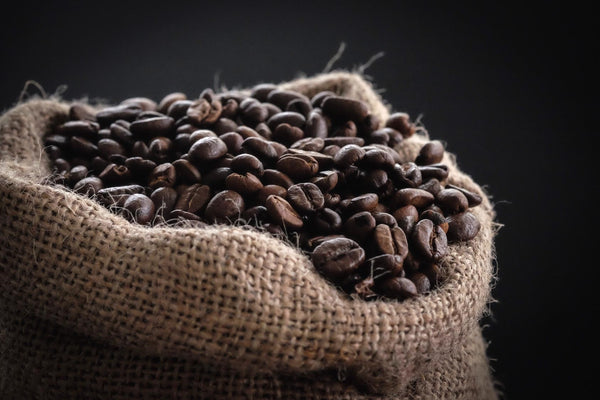Your Cart is Empty
🚚 FREE USA SHIPPING ON ORDERS OVER $30! INTERNATIONAL SHIPPING AVAILABLE.
🚚 FREE USA SHIPPING ON ORDERS OVER $30! INTERNATIONAL SHIPPING AVAILABLE.
3 ways caffeine boosts your metabolism
by Tina Sendin 5 min read

TL;DR Caffeine does boost your metabolism and this article explains the science behind this. However, while this may sound like good news, there are key things to remember, especially in light of drinking coffee to "lose weight."
---
Caffeine has been known for its several benefits – from something so simple as helping you get over that afternoon slump, to lowered risk of Type 2 diabetes, Alzheimer’s and heart disease.
And for those wanting to lose weight, listen up!
Caffeine can also INCREASE METABOLISM.
Yes, you read that right. In fact, increased metabolism is observed for up to three hours after consuming 8 mg/kg of coffee (1).
So how exactly does the magic happen?
COFFEE HAS SUBSTANCES THAT BOOST METABOLISM.
To understand how this works, there are three main substances in coffee that accelerate metabolism:
- Theobromine, found in smaller amounts in coffee and the main stimulant in cocoa (2);
- Theophylline, a stimulant found in cocoa and coffee (3); and
- Chlorogenic acid, a biologically-active compound in coffee (4).

These substances have a significant role to play in how our body takes in sugar and carbohydrates:
- When consumed, theophylline becomes theobromine (5). This process results in insulin sensitivity, helping us better metabolize sugars and steer clear from obesity (6).
- Chlorogenic acid delays the absorption of carbohydrates. One study showed that chlorogenic acid, when added into instant coffee, slowed down the absorption of sugar in the intestines (7). The same result wasn’t found in a regular caffeinated drink.
The study believes that a lot of it has to do with chlorogenic acid altering the way the body transports glucose (8).
Long story short, chlorogenic acid helps us absorb less carbs!
Think of it this way: when people say “coffee boosts metabolism,” they also actually mean...
coffee can help our body slow down the absorption of sugars and carbohydrates.
CAFFEINE HELPS BURN FAT.
Music to the ears, isn’t it? To understand how this happens, you need to know the hormone called epinephrine, which is commonly known as adrenaline.
As caffeine travels through the nervous system –
- It increases epinephrine levels in the blood stream. (9)
- Epinephrine then signals the fat tissues to break down fats and release fatty acids (i.e. omega-3, usually associated with weight loss) into the bloodstream. (10)
However, the presence of fatty acids in your blood doesn’t automatically mean losing weight.
You need to burn more calories than you consume (which almost sounds like common sense, to be honest). You can achieve this by either maintaining a HEALTHY DIET or sticking to REGULAR WORKOUT.

Here’s where caffeine enters the picture...
Research shows that drinking coffee before a workout helps burn more fat than going without it (11). Caffeine increases energy levels during physical exercise and leads to increased endurance.
People who drink coffee before hitting the gym find themselves working harder and longer, burning more calories. (To learn more about this, check out our article on why caffeine before a workout is a good idea.)
The point is, although it helps, caffeine consumption alone doesn’t burn fat. You need to mix it up with a healthy diet and a regular exercise regimen.
CAFFEINE INCREASES METABOLIC RATE.
Your body naturally burns calories in order to function properly. And having a fast metabolism means being able to burn calories more efficiently and – wait for it – lose weight faster.
How’s this possible? Two words:
METABOLIC RATE.
The higher the metabolic rate, the faster the metabolism. Losing weight becomes easier. Eating more and not gaining weight takes less effort.
There are two types of metabolic rate (12):
- Basal metabolic rate (BMR). Often referred to as “metabolism’, this is the calorie count that you need to burn to carry on with everyday tasks.
- Resting metabolic rate (RMR) is the rate at which you burn calories without doing anything (at rest).
With all this caffeine talk, we’ll shine a spotlight on the second one, the RMR.
Studies show that caffeine can increase Resting Metabolic Rate (RMR) by 3–11% (13). The more you consume, the bigger the effect (14).

Keep in mind though that caffeine’s ability to increase metabolism depends on factors like:
- Body Type and Build. Lean people are more likely to enjoy the effects of caffeine on metabolism than obese ones. This was revealed by a study where caffeine could increase the calories burned by 30% among lean participants and only by 10% among obese individuals (15).
- Age. The metabolic effects of caffeine are also more apparent among younger individuals (16).
The catch
While caffeine has been proven to boost metabolism, it’s important to note that the reasons are NOT absolute. There are caveats that we need to keep in mind:
- Your body can build caffeine tolerance. The effects of caffeine on metabolic increase wanes as you consume more caffeine over time (17, 18). Studies note that metabolic effects are observed in the short term, but whether caffeine can help with weight loss in the long haul is yet to be proven.
- Coffee add-ons pack on extra pounds! Whipped cream, milk, caramel and other add-on’s present in espresso drinks (read: lattes, mochas and macchiatos) all contain extra calories. (We’ll spare you the calorie count per drink but if you’re curious, check out Starbucks’ nutrition info for its espresso drinks.) If you’re looking to lose weight, you’re better off sticking to black coffee or other calorie free caffeine options.
- Too much caffeine is NOT good for you. Research suggests that caffeine can spike heart rate and blood pressure while leaving you feeling stressed, anxious and jittery. It can also have a disruptive effect on the quality of sleep. If taken excessively or within 6 hours before going to bed, it can eat up on your snooze time. The National Institutes of Health also reported that caffeine can leave you feeling wired for up to 16 hours after your last cup.
- A study links five or six cups of coffee a day to metabolic syndrome and weight gain (19). Researchers from the Western Australian Institute for Medical Research and the University of Western Australia's School of Medicine and Pharmacology found that drinking more than five or six cups of coffee a day can lead to weight gain. It can also boost your risk of metabolic syndrome, or risk factors related to a large waist size, high blood pressure, and a higher risk of developing chronic diseases, such as diabetes and heart disease.
Conclusion
While caffeine is shown to contribute to weight loss and increased metabolism, having more caffeine doesn’t necessarily translate to burning more calories. The metabolic effects are based on certain factors, observed in studies only in the short-term, and are shown to diminish over time. Plus, consuming more than you’re supposed to can lead to adverse effects.
It’s always good measure to keep your coffee or caffeine consumption in check and avoid caffeine just for the sake of losing weight. If you watch your caffeine intake you can keep enjoying each cup (or mint!) and embrace the added health benefits.
---
If you want to learn more about not just caffeine's effect on metabolism but also the role genetics plays on metabolising caffeine, here's a video by wellness guru Thomas DeLauer:
Sources
(1) https://www.authoritydiet.com/coffee-increase-metabolism-burn-fat-lose-weight/
(2) https://www.ncbi.nlm.nih.gov/pubmed/25750625
(3) https://www.ncbi.nlm.nih.gov/pubmed/23672674
(4) https://www.ncbi.nlm.nih.gov/pubmed/19324944
(5) http://onlinelibrary.wiley.com/doi/10.1111/j.1750-3841.2007.00535.x/full
(6) https://www.ncbi.nlm.nih.gov/pmc/articles/PMC380258/
(7) https://www.ncbi.nlm.nih.gov/pubmed/18035001
(8) https://www.ncbi.nlm.nih.gov/pubmed/14522730
(9) https://www.ncbi.nlm.nih.gov/pubmed/8201901
(10) https://link.springer.com/article/10.1007%2Fs10068-010-0151-6
(12) https://www.authoritydiet.com/coffee-increase-metabolism-burn-fat-lose-weight/
(13) https://www.ncbi.nlm.nih.gov/pubmed/2912010
(14) https://www.ncbi.nlm.nih.gov/pubmed/7486839
(15) http://ajcn.nutrition.org/content/79/1/40.full.pdf+html
(16) http://ajpendo.physiology.org/content/268/6/E1192.short
(17) https://www.ncbi.nlm.nih.gov/pubmed/6298543
(18) https://www.ncbi.nlm.nih.gov/pubmed/1888264
(19) http://www.nydailynews.com/life-style/health/coffee-fat-study-article-1.1357421
Also in Viter Energy Blog

Can caffeine help with ED?
by Mark Miller 3 min read
Erectile dysfunction. In combination, those are two of the ugliest words known to man. But can caffeine help you get it up?
Science hasn't found the definitive answer to this question, but one study concluded that fewer men who consume caffeine have problems performing. The study said:
Caffeine intake reduced the odds of prevalent ED, especially an intake equivalent to approximately 2-3 daily cups of coffee (170-375 mg/day). This reduction was also observed among overweight/obese and hypertensive, but not among diabetic men. Yet, these associations are warranted to be investigated in prospective studies

Caffeine while breastfeeding? Go ahead, it's OK
by Mark Miller 4 min read
Many breastfeeding mothers wonder if it's OK to take caffeine. In fact, many nursing mothers just avoid caffeine in case it would keep their babies fussy, jittery and awake.
The answer is yes, you can take caffeine while breastfeeding, as long as you don't go over about 300 mg a day.
It's an important question because caffeine is in so many products, and taking coffee, tea, or soda is such a common ritual.
And breastfeeding mothers may be tempted to take caffeinated products because they are deprived of sleep by their newborns' odd sleep schedule.

The surprising benefits of chewing gum
by Mark Miller 5 min read
You might think gum chewing is an activity with little or no benefits besides the pleasure and flavor, but think again. Chewing gum has several benefits.
In addition to freshening your breath, sugar-free gum can help prevent cavities and contribute to overall oral health. But that's just the beginning.

